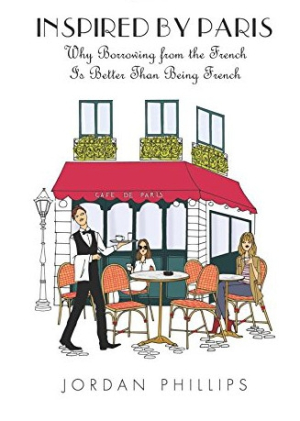Inspired by Paris
Why Borrowing from the French is Better Than Being French
For Francophiles, this book is as irresistible as an open bottle of Dom Pérignon.
Jordan Phillips’s Inspired by Paris is a fun, frothy, and surprisingly useful grand panorama of Parisians and Parisian life.
Using a compare-and-contrast framework to discuss Paris and the United States, and written by an American author who loves and has lived in both, Inspired by Paris pulls away the macaron-hued taffeta curtain that shrouds Paris in a mist of champagne, luxury, and romance to shed light on the real city.
Living in your dream city is not the same as flirting with it. Frustrations and complications pop up, as predictable as sticky fingerprints in the Hall of Mirrors. This book’s mission is to separate the grit from the pearls and to give guidance on how to blend the best, most accessible pleasures of Parisian life into the faster-paced, exploding piñata of the American lifestyle.
Bookended by personal reflections on how she loved and left the City of Light, short, effervescent chapters are used to ponder everything from flirting to café society to Parisians’ legendary indifference to success. The writing style is light, well crafted, and witty, always prompting the consumption of just one more chapter before tumbling back to reality.
Yet beneath the meringue, there’s a good deal of substance. Readers will want to keep the book as a reference for a wide range of information, including the kind of advice only an insider can give. A guide to experiencing the “real” Paris, rather than the one thronged by American and German tourists, is especially valuable.
There are vital guidelines on where—and where not—to eat and shop, how to put together a classic Parisian wardrobe, and the differences between Left and Right Bank wines. Other chapters, such as those on eating for taste and indulgence while keeping off the pounds, will inspire readers to broaden their repertoires of acceptable behavior.
At times this love of all things French goes a bit over the top, and assertions like “There’s no going back to eating ranch dressing again” seem dizzily arbitrary, but the work is generally even-handed. It also calls out Paris for its egregious failures, including conformity, lack of imagination, and social stagnation. In the end, Phillips claims that the one true home of her heart is New York, a city as unlike America as it is unlike Paris.
The book’s three appendices are also a treat. Who knew the city actually perfumed its metro stations, and since 1998 has been pouring 1.5 metric tons of it into the stations each and every month? Illustrations are more of a miss, as they do not match the wit and sophistication of the writing.
For anyone who loves Paris, hates Paris, has visited it, has lived in it, or has fantasized about such revelries, this book is as irresistible as an open bottle of Dom Pérignon.
Reviewed by
Susan Waggoner
Disclosure: This article is not an endorsement, but a review. The publisher of this book provided free copies of the book and paid a small fee to have their book reviewed by a professional reviewer. Foreword Reviews and Clarion Reviews make no guarantee that the publisher will receive a positive review. Foreword Magazine, Inc. is disclosing this in accordance with the Federal Trade Commission’s 16 CFR, Part 255.

